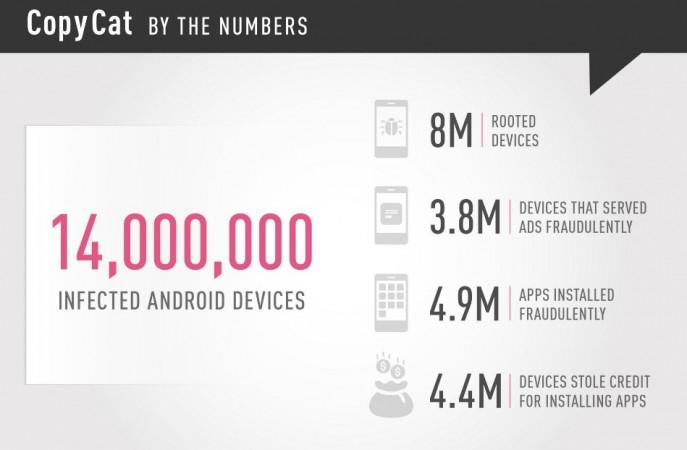A malware dubbed as 'CopyCat', which is known to have affected more than 14 millions of Android devices since one year, is said to be still in running several thousands of devices.
Security firm, Check Point, which first discovered CopyCat, says it has affected the users in South East Asian markets the most (55%), followed by Africa (18%), Americas (12%), Oceania (8%) and Europe (7%).
Also read: After WannaCry ransomware, Chinese Fireball malware strikes the world; India worst-affected
So far, CopyCat, which has infected more than 14 million Android devices, is said to have garnered $1.5 million dollars in revenue for the malware campaigners via un-authourised display of ads on the phone.
What is CopyCat and how it works?
CopyCat is said to be a fully developed malware, which has been incorporated in popular apps. It is capable of inflicting serious damage to security of the device, as it can root devices, establish persistency, and inject malicious code into Zygote – a daemon responsible for launching apps in the Android operating system – that allows the malware to control any activity on the device.

Should you be worried about CopyCat?
Yes, Android mobile users need to be very vigilant about the CopyCat. Though there are no reports of data theft, it still poses a serious threat to security of information in the phone, as it can take full control of the device and you can do nothing to stop it, until it's too late.
How to protect Android phones from CopyCat and other malwares?
- Always keep to your smartphones updated with latest firmware; most companies send software updates, especially security patches on priority basis and always make sure to update them immediately
- Make sure to use premium Anti-virus software, which also provides malware protection and internet security
- Never ever open email sent from unknown senders
- Never ever install app (for browsers) and application softwares on the mobile phones from un-familiar publishers

After conducting extensive research, Check Point has informed Google about the CopyCat malware in March 2017. Taking note of the seriousness of the issue, the Search Engine giant, to an extent, was able to control the spread. But, it is believed that there are still several users still unaware of CopyCat, continue to use malware-riddled apps on their phones.
Watch this space for latest news on malware alerts and cyber security.

















